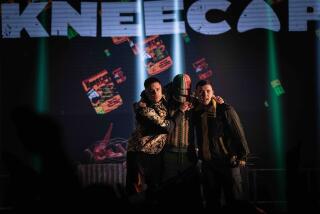MUSIC REVIEW : Fureys Whip Up Unique Brand of Irish Folk Music
- Share via
SOLANA BEACH — Finbar Furey--singer, banjoist, and Uillean pipes player extraordinaire for the Irish folk group that bears the family name--likes to relate a story about a radio interviewer’s ill-advised attempt at comparing the Fureys to a better-known Irish group. After listing the Rolling Stones, Paul McCartney and other rock superstars that the Chieftains have played with over the years, the questioner turned to Furey.
“So, how about you guys?” he asked.
“Oh yeah,” Furey deadpanned, “the Chieftains have played with us, too.”
In addition to exhibiting the wit that is an essential element of the Fureys’ charm, the anecdote underscores a fact of life for the group: outside their native Ireland, people perceive the four Furey brothers as one of several outfits performing in the shadow of Ireland’s most famous musical export.
San Diego is no different. Last December, the Chieftains played to a thousand fans at Copley Symphony Hall. On Wednesday night, the Fureys played to a couple of hundred at the Belly Up Tavern. Attendance notwithstanding, the group demonstrated why it rates superlatives from press and public alike.
To fully appreciate the Fureys, which in Wednesday’s show included George on guitar, Eddie on guitar and mandolin, Paul on accordion and a non-relative, Francie Conway, playing a keyboard so discreetly as to be virtually inaudible, an important distinction must be made.
The Chieftains play a pure form of traditional Irish music on traditional instruments (Derek Bell’s occasional piano playing being an exception). The music they make is wondrous, but no matter how emotionally affecting it might be, the listener enjoys it from a respectful distance, as one does a medieval tapestry in a museum. By comparison, the Fureys’ songs have the immediacy of a personal tale told to friends over a pint in a neighborhood pub.
The group’s strongest link to traditionalism is Finbar, who learned music from his late father, the great traditional Irish musician, Ted. A recognized master of the Uillean pipes (a distant cousin of the Scottish bagpipes), Finbar also is the group’s only true virtuoso. The eldest brother, Eddie, on the other hand, was a corrupting influence, running off to join rock bands during the early days of the British Invasion, and returning home slinging a very non-traditional guitar.
The Fureys, then, play a unique brand of Irish folk music, which, while built upon a traditional Celtic foundation, has a more contemporary sound that frequently features four-part vocal harmony. Some of the tunes in their repertoire date to the last century; many were written by still-living contemporaries. All feature great melodies and lyrics with deep emotional content.
The concert opened with a slow, melancholy instrumental featuring Finbar on flute. Within a few bars, he had hooked the audience, bending the melody with painfully deliberate, arcing slurs, as though the notes were stiff joints. The crowd responded enthusiastically.
For the most part, the Fureys stuck to what has been their basic set list in recent years. George sang “Gallipoli,” a waltz-metered ballad in which an Irish father mourns a son killed fighting for the British in the infamous battle.
Finbar on Uillean pipes and Paul on penny whistle etched the piece with appropriately lachrymose lines. Eddie sang the upbeat strummer, “(It’s a Long, Long Way) From Clare to Here,” which segued into a rapid reel featuring Finbar in a furious pipes solo, with Eddie switching from guitar to the bodhran, or hand-held drum.
This being an Irish concert, there were many songs about love, separation, longing, and loss, and each ode seemed to reach deeper into the soul. An old ballad from New Zealand, in which a man forced by occupying British forces to leave his homeland and his betrothed, was made especially moving by Eddie’s sweet mandolin accompaniment.
Finbar (banjo) and Eddie (mandolin) created lovely interplay on “When You Were Sweet Sixteen,” a sentimental love song by Tipperary-based Irish songwriter Jim Thornton that tightened one’s throat. There was “The Old Man,” a loving tribute to the Fureys’ father that was written in 1983 by Phil Coulter. And, there was “The Green Fields of France,” a World War I remembrance that kept the Fureys on the Irish charts for three years.
But the most emotional note of the evening came with the ballad, “Dreams of Dreams.” In introducing it, Finbar told of a young couple’s vow that no matter how much distance might separate them, one always would send for the other.
“Of course, the boy leaves Ireland, and she never sees him again,” Finbar said. “So, imagine her, many years later, walking in the morning chill, thinking about her beloved and the vow they had made.” By the time the song ended, with Finbar contributing an achingly poignant flute melody, even the boisterous people at the back of the Belly Up were quiet.
Not that everything the Fureys played was morose. The group encouraged sing-alongs on such upbeat, waltz-metered numbers as “Red Rose Cafe” (a huge hit in Ireland) and “Steal Away,” and on the rousing homecoming song “It’s Good to See You.” And Finbar kept intact his reputation as an entertaining raconteur with a long tale about his fear of flying that had the crowd laughing continuously.
But one can’t leave a Fureys concert without feeling that long dormant emotional synapses have been bridged. On an otherwise pleasant summer’s eve, the brothers put a modest but appreciative audience in touch with its melancholy Irish soul.
More to Read
The biggest entertainment stories
Get our big stories about Hollywood, film, television, music, arts, culture and more right in your inbox as soon as they publish.
You may occasionally receive promotional content from the Los Angeles Times.










